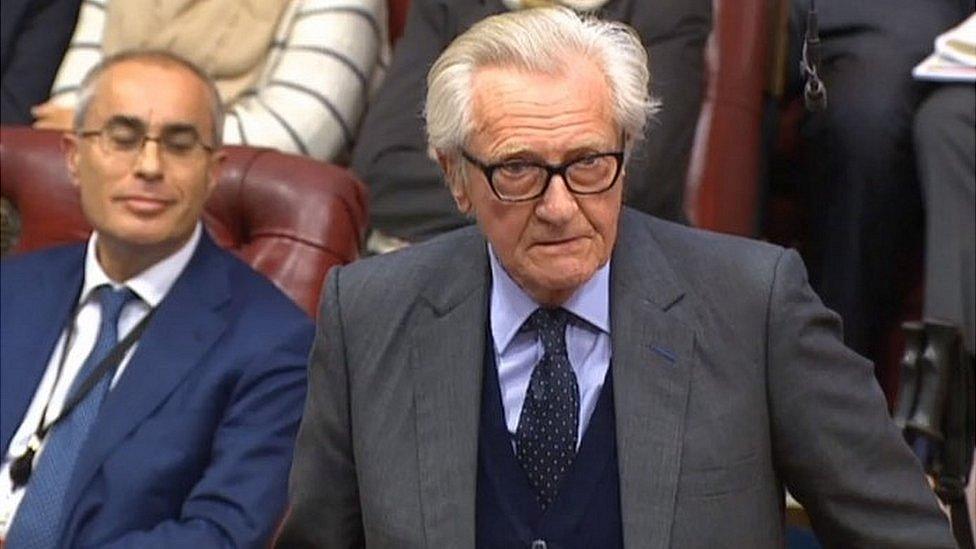David Davis urges MPs 'not to tie PM's hands' over Brexit bill
- Published
David Davis: "The issue of the rights of citizens is the first thing"
David Davis has urged MPs to back the Brexit bill and insisted the UK would be prepared, if it has to leave the EU with no deal in place.
The Brexit secretary urged MPs not to "tie the prime minister's hands" over MPs getting a final vote on the deal and on EU citizens' rights in the UK.
He said while they were preparing for a "no deal" Brexit he thought it was unlikely negotiations would break down.
The bill returns to MPs on Monday after two defeats in the Lords.
Peers want to guarantee the rights of EU citizens in the UK and to ensure Parliament has a vote on any deal in two years' time.
Labour's Sir Keir Starmer said they would fight to keep the amendments in the Bill, urging the government: "Don't just have this obsession with getting Article 50 triggered this week".
If MPs do pass it, Theresa May could trigger the formal process of Brexit as early as Tuesday.
The prime minister has said she will take the UK out of the EU even if Parliament votes against the deal she is offered.
Mr Davis, who will lead negotiations for the UK, addressed the issues of citizens' rights and a Parliamentary vote in an interview on BBC One's Andrew Marr Show.
"It's inconceivable to me that there wouldn't be a vote on the outcome," he said.
He urged MPs: "Please don't tie the prime minister's hands in the process of doing that, for things which we expect to attain anyway."
'No veto'
Pressed on whether a rejection by Parliament of any deal would send the UK back to the negotiating table, he said: "It's a two-year time [limit] on Article 50 so there'll be a limit to which we can do that.
"What we can't have is either House of Parliament reversing the decision of the British people - they haven't got a veto."
He said citizens' rights in the UK and Europe would be "the first thing" discussed in Brexit talks and said he believed there was a "moral responsibility" to EU citizens but the issue had to be "resolved together" with other EU countries.
He also said the government was working on "a contingency plan" in case a deal could not be reached with the EU - after a report by the Foreign Affairs Committee said it had found no evidence of serious contingency planning, external by the government.
'Not apocalyptic'
Mr Davis said he believed it was "not remotely likely" that there would be a complete breakdown in negotiations.
But he said: "The simple truth is, we have been planning for the contingency, all the various outcomes, all the possible outcomes. It's not just my team, it's the whole of Whitehall, it's every single department. But, understand, it's the contingency plan. The aim is to get a good outcome."
International Trade Secretary Liam Fox, told BBC Radio 5 live's Pienaar's Politics: "Certainly it wouldn't be the end of the world if we had no deal, but it would be preferential to have a deal".
Foreign Secretary Boris Johnson told ITV's Peston on Sunday: "It would be perfectly OK if we weren't able to get an agreement but I'm sure that we will."
He added: "I don't think the consequences of 'no deal' are by any means as apocalyptic as some people like to pretend."
Tories 'feel betrayed'
His comments were dismissed by the Conservative former deputy PM Lord Heseltine as "rubbish".
The Tory grandee, who was sacked last week as a government adviser having voted against the Brexit bill in the Lords, told ITV: "The fact is that a huge number of Conservatives are appalled, they feel they have been betrayed by what is going on now."
Shadow Brexit Secretary Sir Keir urged the PM to consider keeping the "really important" Lords amendments - adding that EU citizens in the UK had been "left in limbo".
He told Sky News that the prospect of the UK "crashing out without a deal" would be "a disaster".
"You absolutely have to have a vote in Parliament before that could possibly happen. So we'll be fighting for those tomorrow," he said.
The bill could complete its final stages on Monday if the Lords accepts the decisions made by MPs.
Among potential Conservative rebels is the MP Anna Soubry who told BBC One's Sunday Politics she had not heard any assurances that Parliament would get a vote in the event of no deal being reached.
Without them, she said: "I will either vote against my government which I do not do lightly… or I will abstain, which... has pretty much the same effect."
- Published10 March 2017

- Published7 March 2017

- Published30 December 2020
